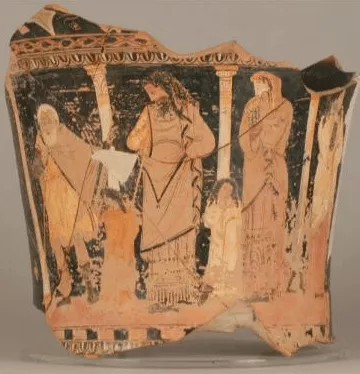One of the exciting and demanding elements of A Level Classical Civilisation is the requirement for students to make use of ‘scholars and academics in order to further develop their analysis and argument’.
On Friday 17th November two of our Year 12 pupils attended the Harrodian Classics Conference to hear three scholars from the University of Oxford in the flesh. Here, Alistair A, Year 12 reflects on the lecture for students of the ‘World of the Hero’ Unit in A-Level Classical Civilisation.
Heroism in Homer and Virgil, Professor Richard Jenkyns
On Friday, Professor Richard Jenkyns from Lady Margaret Hall, lectured us on ‘Heroism in Homer and Virgil’. Jenkyns argued that Achilles is actually a very unusual hero. To support this he pointed out how in Homer’s Iliad, the plot revolves around the wrath of Achilles, the hero of the Epic. The first word in The Iliad is menin, meaning ‘wrath’, which sets the tone for the rest of the epic. This differs from his other epic, The Odyssey, which revolves around how one man travels round the world trying to reach his homeland, the first word of the Odyssey being andra, meaning ‘man’, which shows the difference in focus that The Odyssey has compared to The Iliad. It also greatly differs from the first half, the ‘Odyssean’ section, of the Aeneid.
In the Iliad Achilles only ever performs in a traditionally heroic way when he seeks revenge for the death Patroclus, his close friend. However, at the beginning of the poem, when he refuses to fight as a form of vengeance on King Agamemnon who has taken away his slave-girl, Briseis, Achilles shows off the other traits and abilities that make him so much more than traditionally heroic as Achilles refuses all bribes from Agamemnon to get him to fight. In Book 9 Achilles even turns down an offer of the return of Briseis, women and a gigantic share of the spoils collected when they finally sack Troy, because he knows Agamemnon is not attempting to apologise: he is attempting to make Achilles yield to him. This scene is the perfect demonstration of Achilles’ intelligence and morality: not slightly fazed by such an offer. It’s also as if Achilles knows all and sees all in this scene, which is an ability that makes him seem so very heroic in this book.
Achilles is also shown as unusual due to his musical gifts. When the embassy of men reach his quarters Book 9 of the Iliad they find him ‘entertaining himself on a tuneful lyre’, Jenkyns made the point that there are no other examples of great fighting heroes who show gifts in the musical arena from ancient stories: Achilles is the only one. At this point we as the reader can only admire this man who clearly has a desire to gain excellence in all fields of ability. Achilles is shown as not just a fearless warrior but also as an intellectual, gifted aesthete and lover of the arts. In that way Achilles is certainly shown as unusual to both an ancient and a modern audience. This is because for an ancient audience, the experience of witnessing the great, mythical Achilles being so gentle and intellectual would have certainly been strange, as they had not yet encountered such a hero. Modern audiences tend to be filled with people who are more gentle than those from 3,000 years ago. Thus from a modern perspective, Achilles is shown as more relatable and admirable to us as he seems to be not as savage and merciless as other heroes.
Jenkyns also pointed out his belief that The Iliad was in reality a precursor to tragedy due to its setting. The epic is set in this Heroic world where warfare dictates life and every man is out for glory and fame, kleos, and every woman and child sits at home hoping to not be enslaved or brutally slaughtered. In that sense it was the perfect world, perhaps not to modern standards, but definitely to an ancient audience. We must understand that to a Greek man these people who are dying are the epitome of what they wish or had wished to be in life. The Iliad is a book where every character has a name and a story, where every character has an epithet, a father and a place of origin. In Homer’s Odyssey only a select few characters have the opportunity for these honours but in the Iliad almost everyone has it, whether it be Achilles, Odysseus, Agammemnon, Menelaus or a host of smaller players. In that sense The Iliad is a sad tale of two armies filled with great and generationally strong and fearless warriors slaughtering each other, a tale of the destruction of a heroic, rich and famous city and the death of countless admirable men.
